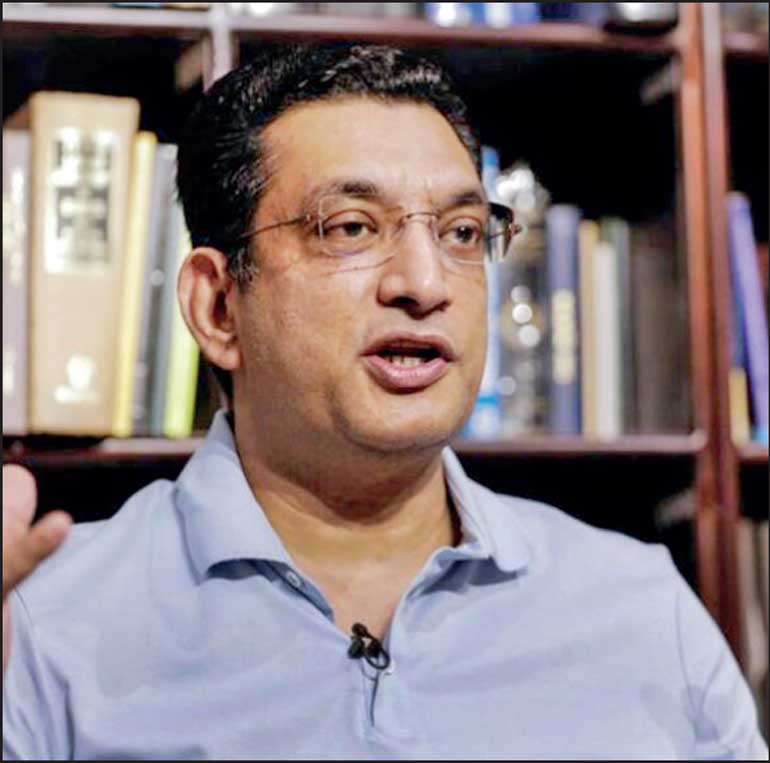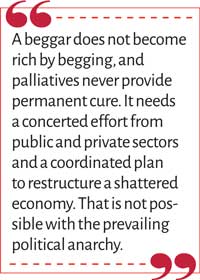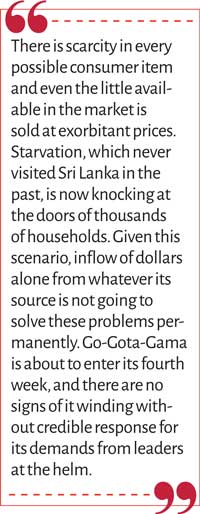Sunday Feb 15, 2026
Sunday Feb 15, 2026
Monday, 2 May 2022 00:17 - - {{hitsCtrl.values.hits}}

Minister of Finance Ali Sabry
The newly appointed Minister of Finance, Ali Sabry, whose expertise is in law and not in economics or finance, expressed premature optimism about the country’s economic revival after returning from his team’s discussion with IMF officials in Washington. According to him the financial and economic difficulties facing the nation would be overcome in a month’s time with “soaring support” from international bodies and friendly nations. While everyone wishes that to be true, one fails to see any hard evidence for such a prospect.
expressed premature optimism about the country’s economic revival after returning from his team’s discussion with IMF officials in Washington. According to him the financial and economic difficulties facing the nation would be overcome in a month’s time with “soaring support” from international bodies and friendly nations. While everyone wishes that to be true, one fails to see any hard evidence for such a prospect.
It is true that the minister and his company had a fruitful discussion with IMF officials, and there was agreement on the mechanism of IMF’s suggested pathway to achieve some sort of economic stability. Among its recommendations are tight monetary policy to counter escalating inflation, flexible exchange rates to reduce currency speculation and rupee depreciation, and higher taxes to improve Government revenue. The first two are within the powers of the Central Bank and they have a short lag time in impacting market activities. But the third is a budgetary measure that has to be legislated through Parliament. Given the state of political anarchy prevailing in the country it will take some time for the Parliament, Government and the presidency to put their acts together to repair the damage they have collectively caused to the economy.
In the meantime, IMF debt restructuring strategy has run into difficulties with China expressing unwillingness to include its $ 3.5 billion debt into that plan. How will IMF deal with this complication is yet to be seen. This would at least delay IMF’s credit assistance. World Bank, according to the minister, had agreed for an immediate bridging finance facility to the tune of $ 300-$ 600 million. Lately, Indonesia has agreed to send 3.1 tons of humanitarian aid by way of essential medicines and medical equipment. In addition, there are the two credit line facilities, one with India and the other with China. If this is all what the minister described as “soaring” support for Sri Lanka’s struggle then one has to question his timeframe of one month to get rid of the economic pain. The Prime Minister was also quick to share that optimism and predicted that all protests to disappear soon.
disappear soon.
While the minister is raising false hopes to save the tottering regime, ground reality is injecting more and more pessimism and desperation. There is no end to the long consumer queues in front of retail outlets to buy a few essentials and those queues are getting longer and longer. An eighth victim has been reported to have died while waiting to buy kerosene. There is scarcity in every possible consumer item and even the little available in the market is sold at exorbitant prices. Starvation, which never visited Sri Lanka in the past, is now knocking at the doors of thousands of households. Given this scenario, inflow of dollars alone from whatever its source is not going to solve these problems permanently. A beggar does not become rich by begging, and palliatives never provide permanent cure. It needs a concerted effort from public and private sectors and a coordinated plan to restructure a shattered economy. That is not possible with the prevailing political anarchy.
This is why minister Sabry’s optimism is misplaced and premature. He is an apprentice to economic management like his predecessor in that post and trying his best to serve and protect his master, the President, who is the primary cause for the current economic ills and against whom there is public outcry to quit. Harry Belafonte, the veteran American actor and singer once called the former US Secretary of State Colin Powell a “house slave …who got the privilege of living in the house if you served the master exactly the master intended to have you serve him”, for the Secretary’s support to President Bush’s invasion of Iraq based on false intelligence.
In the case of minister Sabry he is trying hard to promise a speedy economic recovery in the midst of too many uncertainties and questionable assumptions. \
At the same time, there are a few crazy moves from within the Opposition to form a so-called all-party interim government with a new Prime Minister. If that succeeds with or without MR there will be a new cabinet and whether Sabry would continue as finance minister is doubtful.
government with a new Prime Minister. If that succeeds with or without MR there will be a new cabinet and whether Sabry would continue as finance minister is doubtful.
The problems facing the country are too many and too complex and they need a new system and a new approach. This appears to have been understood by the new generation of Sri Lankans who are not prepared to drink anymore of the old wine served in new glasses. Aragalaya represents this hard truth. This generation understands what its rights are in a democracy, and how those rights of their parents and grandparents were trampled by political regimes that represented particular group interests. Go-Gota-Gama is about to enter its fourth week, and there are no signs of it winding without credible response for its demands from leaders at the helm.
Public opinion from several counts indicates solid support to this novel experiment. World outside is also watching developments too closely. To the Rajapaksa clannish regime these are desperate times. Yet, one could only hope and pray that with support from its partisan saffron backers, business moguls and the President’s command over the military the regime would not resort to any foolhardy desperate move to suppress the aragalaya and plunge the country into even darker days.
(The writer is attached to Murdoch Business School, Murdoch University, Western Australia.)